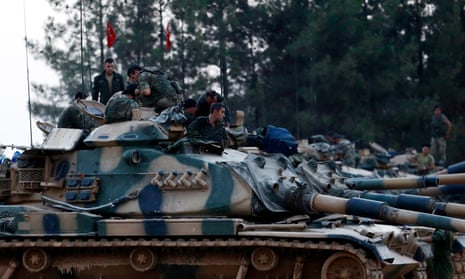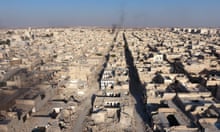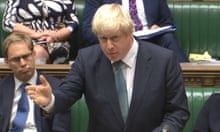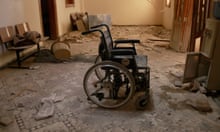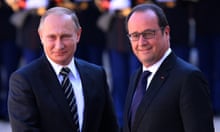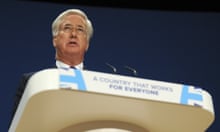Turkish tanks have moved rapidly through the Syrian town of Jarablus on Wednesday, ousting Islamic State from one of its last border strongholds – but the most important outcome in Ankara’s eyes was beating the US-backed Kurdish fighters in a race to seize the surrounding area.
In a pointed concession to Turkey, the US vice president Joe Biden demanded that Kurdish forces, who had been a central US proxy in the battle against the terrorist group, “move back across the Euphrates river”, to the east of Jarablus. He also said that the Kurds, who have won a series of recent battles against Isis, would be abandoned if they advanced. US jets gave cover to the Turkish push, one of the first times in the war that the two allies have conducted a joint operation.
“They cannot, will not, under any circumstance get American support if they do not keep that commitment,” Biden said in Ankara during a visit to reset ties with Turkey, which had been strained since the failed coup attempt in July.
The Turkish incursion, which was supported by Syrian rebels, was the largest into Syria in the five-year civil war and came after months of gains by Kurds in the north which had seriously tested relations with Washington and transformed the once-dormant border into one of the war’s most important battle zones.
Bystanders throughout much of the war, Kurdish groups in Syria’s north-east had made swift gains after Russia’s intervention to reinforce President Bashar al-Assad. At the same time, the Kurds had been pivotal to US efforts to break the grip of Isis in the area, being used as a proxy force by US trainers and given air support by fighter jets.
The development incensed Ankara, which insists that the Kurds were using the war to advance a de facto autonomous region aligned with the aims of a four-decade-long insurrection being waged by Kurdish groups in Turkey’s south-east. Turkish officials have repeatedly pointed to Kurdish manoeuvres along its 500-mile frontier as evidence of a plan to move Arabs from the area and create a buffer allowing the Kurds to consolidate influence in the area.
In recent months, Turkey has stepped up its support for Syrian rebels battling both Isis and the Assad regime. The influence of rebel groups in the north had previously waned under Russian airstrikes and the creep of jihadi groups, who had gradually taken the ascendancy in key campaigns, such as the fight for Aleppo.
A Turkish move to re-arm Syrian rebels, including jihadis, earlier this month had led to the siege of Aleppo imposed by Assad loyalists being broken and a supply line being reopened.
Since then, Turkey has stepped up efforts to deter the Kurds from making further advances and to keep open access to Arab rebel areas.
At the same time, Ankara has set aside a feud with Russia, which shares its insistence that Syria’s current borders be preserved. Recent public statements about talking to the Syrian regime give weight to a growing view in the region that Turkey views keeping Syria intact as a higher priority than removing the Syrian leader – a key goal of the Turkish leadership for the past five years.
Biden’s demands that the US-backed Kurds go no further is likely to reassure Ankara, which had publicly denounced Washington’s efforts against Isis, even as a Kurdish-led force, comprised of some Arab units, pushed Isis from the city of Minbij earlier this month, splintering a supply line between the town of al-Bab, near Aleppo, and Raqqa to the east, which remains one of the group’s two most important hubs.
However, the effect on the US-Kurdish relationship is less clear. The Syrian Kurdish political arm, the PYD, said in response to the campaign that “Turkey will be defeated just like [Isis]”.
